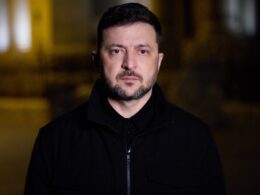Amid the ongoing Russo-Ukrainian war and US President Trump's push to hold Moscow-Kyiv peace talks to stop the war, top Russian and US officials are set to hold talks in Saudi Arabia on 18 February 2025. The meeting is aimed at improving bilateral relations and negotiating an end to the war in Ukraine, without Ukrainian representatives present, AP reports.
The meeting between the two countries' top diplomats in Riyadh marks their most significant diplomatic engagement since Russia started its full-scale invasion of Ukraine almost three years ago. According to AP, the meeting is intended to pave the way for a meeting between US President Donald Trump and Russian President Vladimir Putin.
Earlier this month, Trump significantly altered US policy toward Ukraine and Russia, announcing that he and Putin had agreed to begin negotiations on ending the war.
Russian Foreign Minister Sergey Lavrov and Putin's foreign affairs adviser Yuri Ushakov arrived in the Saudi capital on 17 February. Ushakov stated the talks would be "purely bilateral" and would not include Ukrainian officials, according to AP.
US Secretary of State Marco Rubio, national security adviser Mike Waltz and Special Envoy Steve Witkoff will meet with the Russian delegation, State Department spokesperson Tammy Bruce said.
Russia frees another American ahead of talks in bid to curry favor with Trump
Russia has released an American citizen who had been detained on drug charges, just hours ahead of the US-Russia talks, according to Sky News. The New York Times reported that Kalob Byers Wayne was released by Russia on 17 February.
The 28-year-old had been arrested at Moscow's Vnukovo airport on 7 February after flying in from Istanbul, facing drug smuggling charges for allegedly attempting to bring cannabis-laced marmalade into the country.
Earlier, a Kremlin spokesperson told US media that the Saudi-based talks would aim to improve relations between Moscow and Washington, adding that "certain events can be viewed in this context."
Historical perspective on excluding affected nations: devastating results
Ukrainian President Volodymyr Zelenskyy has stated Ukraine will "never accept" any decisions made in talks without its participation to end Russia's three-year war in the country.
In an article published on The Conversation, Professor Matt Fitzpatrick from Flinders University wrote that the decision to negotiate Ukrainian sovereignty without Ukrainian representation - along with Trump's attempt to claim half of Ukraine's rare mineral wealth in exchange for continued US support - reveals Trump's perspective on Ukraine and Europe.
Fitzpatrick notes this is not unprecedented, citing seven historical examples where major powers negotiated borders or spheres of influence without input from affected populations:
- The Scramble for Africa (1884-85): European powers divided the African continent without African representation, leading to colonial atrocities.
- The Tripartite Convention (1899): Germany and the United States split Samoan islands between themselves despite Samoans' desire for self-rule.
- The Sykes-Picot Agreement: Britain and France redrew Middle Eastern borders during World War I without Ottoman participation, creating decades of conflict.
- The Munich Agreement (1938): Britain, France, Italy, and Germany decided Czechoslovakia's fate without Czechoslovakian representation, becoming a classic example of failed appeasement.
- The Évian Conference (1938): 32 countries met to address Jewish refugees fleeing Nazi Germany, without allowing Jewish representatives to participate in negotiations.
- The Molotov-Ribbentrop Pact: Nazi Germany and the Soviet Union divided Eastern Europe into spheres of influence, with some Eastern Europeans viewing current US-Russia talks as similar secret diplomacy.
- The Yalta Conference (1945): Churchill, Stalin and Roosevelt decided post-war Europe's fate, creating the Cold War division and establishing Soviet control over Eastern European buffer states.
Fitzpatrick suggests Putin may be attempting to emulate this historical model of politically controlled buffer states in eastern and southeastern Europe today.
Related:
- “Unthinkable”: French FM Barrot rejects Russia’s G7 return, citing aggression and security threat
- Zelenskyy rejects to recognize US-Russia talks in Saudi Arabia excluding Ukraine
- Zelenskyy warns against “Afghanistan 2.0” scenario in Ukraine
- Ukrainian delegation arrives in Saudi Arabia ahead of Zelenskyy’s visit
- Zelenskyy warns of potential Russian summer offensive on Europe, urges European role in peace talks
- EU needs special envoy for Ukraine after US blocks Europe’s peace role, two leaders say
- Zelenskyy: Ukraine will not legally recognize its occupied territries as part of Russia





